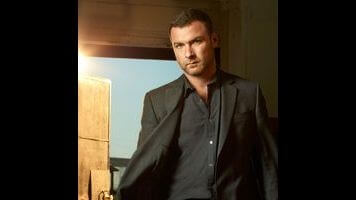Ray Donovan: “Same Exactly”

Ray Donovan had so much faith in its season finale, “Same Exactly,” that it aired it right across from an hour of tonight’s broadcast of the Emmy awards. A strange choice, because Ray Donovan is a show that Showtime wants to be one of its award-winning prestige dramas. But unfortunately I doubt that praise is forthcoming. “Same Exactly” is a disappointing end to this first season, and doesn’t promise much of interest for the future.
As strong as the past few episodes of Ray Donovan have been, the show is unfortunately too ill-conceived to be anything more than a curiosity. “Same Exactly” fittingly repeats many of the flaws of the first half of this season, muddling through an hour of television that doesn’t seem connected much to anything that happened in this season to date or even to anything else in the episode. “Same Exactly” tries very hard to be conclusive while still leaving a door open for whatever might happen in season two. But the material available in Ray Donovan doesn’t offer enough substance for anything that nuanced, so the episode feels monotone and anticlimactic. It’s a very disappointing episode, in fact, largely because the reveals that are supposed to be important to the show fall flat, and basically might as well never have happened.
I’m thinking chiefly of the long-awaited heart-to-heart between Mickey and Ray that tries to illuminate the psychological intricacies of that relationship. The reveal is that Mickey didn’t believe Ray’s story about being molested, and worse, punished him for “telling lies.” It’s reprehensible, to be sure, but it’s essentially nothing more than what we have suspected is true about Mickey all along, which is that he was a neglectful, dismissive father. Mickey tries to apologize, and Ray ignores it, but then later in the episode Mickey once again kills to save his life. That, we’ve seen before. “Same Exactly” offers nothing new. What would have been nice is a small moment of forgiveness or understanding from Ray, but nothing is forthcoming. It’s puzzling. Liev Schrieber is a competent actor and could certainly carry the weight of a man who is trying to change. But the writers of Ray Donovan seem to have little interest in having Ray change; they’re more interested in making him a victim, than making him responsible for his actions.
Along those lines, I found myself very frustrated with the way that the Donovan marriage subplot resolved itself. Abby’s frustrations with Ray’s behavior in “Same Exactly” yield to her desperation to save the relationship. Ray gets away with being the same evasive, violent, emotionally deadened husband he’s been all season, and the takeaway appears to be that Abby just has to deal with it, because she’s lucky she has him. It’s a terrible letdown for both characters, because Ray has relied on Abby to cut through his multilayered self-deception, and Abby has been finding her independence and her voice in challenging the way Ray runs things. But “Same Exactly” is content with letting Ray get away with it—in the final scene, he turns up bloody and asleep near his family, no explanations, no attempt to communicate—and for a show that has otherwise expressed some nuance, it’s hard to let that go.
In fact, nuance is alluded to earlier in the episode, when Mickey tells Ray that they’re “the same exactly” in temperament and interest; wrathful, defensive, and loyal. There’s a sort of compassion and judgment for both characters in that statement, but the show doesn’t really follow through. The same goes for Bunchy’s sudden transformation into an adult (we’re to believe he found murder therapeutic?) and Terry’s sudden transformation into a moral authority. The substance of both brothers’ character arcs is good, but Bunchy’s creepy conversation with the boy who found his bike and Terry’s sudden meltdown with Frances don’t feel rooted in the show.
Even the eventual, inevitable murder of James Woods’ character Sully feels unfulfilling; in a gathering of that many murderers, someone has to die, and Ray and Mickey need to stay around to continue their father-son dynamic. Woods has been so excellent in the role—and Ray’s betrayal of Mickey, so Shakespearean—that the plotline deserved more than a fraught moment or two on a marina.
Ray Donovan is nothing more and nothing less than a phoned-in, lazily made show; no one who is working on it cares very much about it, at least on the writing side. It’s well-cast, but is not much beyond that, and it’s hard to imagine that without serious changes the show will manage to be compelling in its second season.
Finale Grade: D
Season Grade: C
Stray observations:
- I never thought I would like Mickey, but he grew on me.
- Bridget and Conor’s conversation about how Conor was eating his feelings is kind of funny.
- Lena was in this episode, and bonds with Bridget about stuff? Seriously, what is this show?